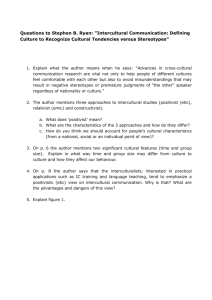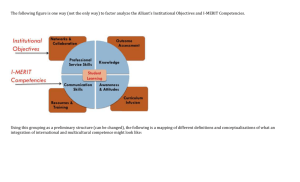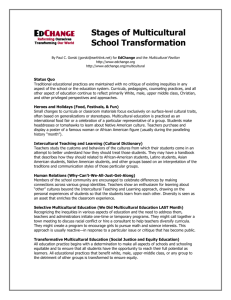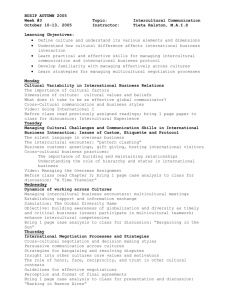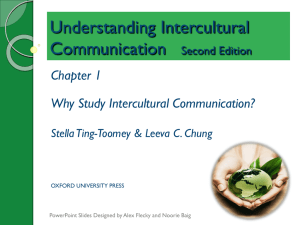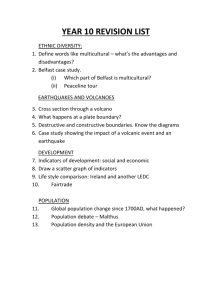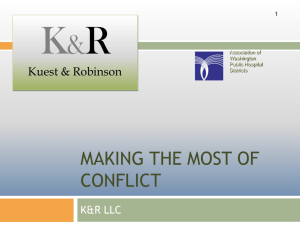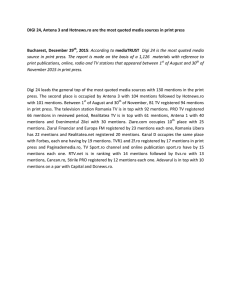Individual activity of Team Builiding for Group C
advertisement
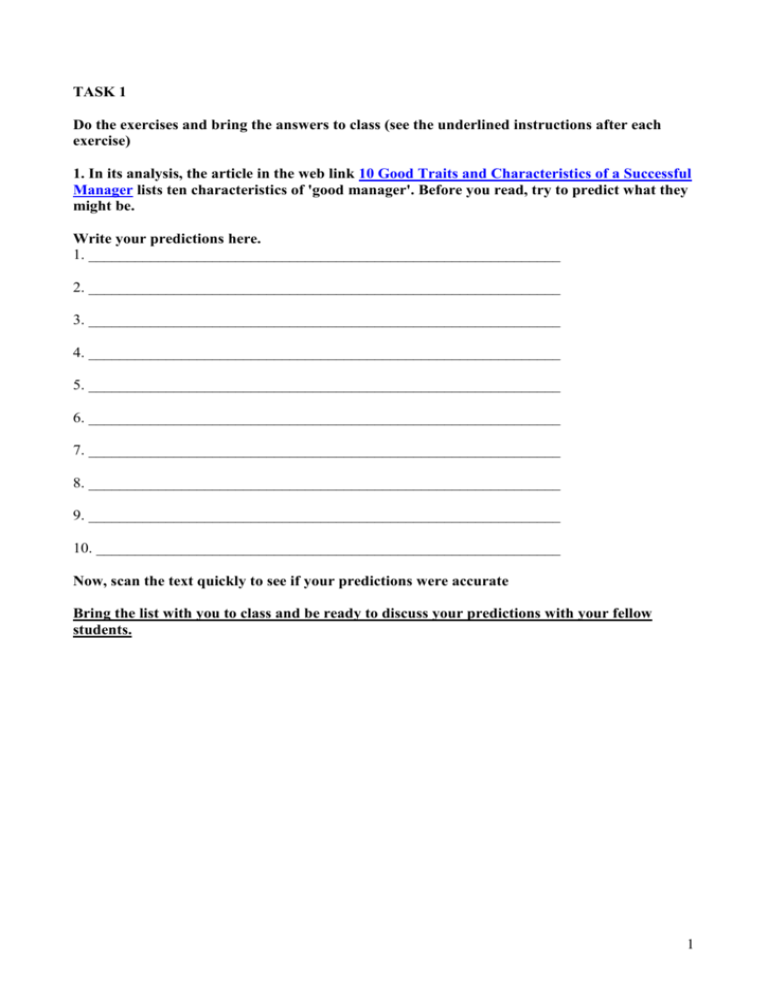
TASK 1 Do the exercises and bring the answers to class (see the underlined instructions after each exercise) 1. In its analysis, the article in the web link 10 Good Traits and Characteristics of a Successful Manager lists ten characteristics of 'good manager'. Before you read, try to predict what they might be. Write your predictions here. 1. _____________________________________________________________ 2. _____________________________________________________________ 3. _____________________________________________________________ 4. _____________________________________________________________ 5. _____________________________________________________________ 6. _____________________________________________________________ 7. _____________________________________________________________ 8. _____________________________________________________________ 9. _____________________________________________________________ 10. ____________________________________________________________ Now, scan the text quickly to see if your predictions were accurate Bring the list with you to class and be ready to discuss your predictions with your fellow students. 1 TASK 2 1. Read the article by Robert J Brow, director ( Europe) of Moran, Stah & Boyer, specialists in intercultural management Pan European Team Work article.pdf 2. Note the key points under the following headings: the problems of working in multicultural groups how cultural pre-conceptions affect people's views and attitudes overcoming obstacles to effective teamwork 3. Answer the questions a) What kind of problems does language develop in multicultural teams according to the author? b) What was the influence of different cultural backgrounds of the team members? c) What constitutes the culturally biased problems the author mentions? c) How were the problems solved? 4. Vocabulary 1. What does the "to take refuge to sg" ( line 3)mean? 2. How would you define "conspicuous" (line8)? 3. What does the author mean when she says she "crystallised" the learning" ( line 36)? 4. What word /s could substitute "emerge over" (line38)? 5. How would you describe arguments that are "coherent" (line 52)? 6. What could be the synonym of "manifestly" (line 63)? 7. What does "to endorse" mean (line 66)? 8. What kind of stereotypes are the ones the author describes as "preconceived" (line 76)? 9. What could be synonym of "cathartic" (line 93)? 10. How would you define "adversarial relationships" in a team? 11. If something is done "in jest", what kind of activity is it? 2 3. Discussion questions in Blackboard Prepare the group discussion in Blackboard by answering the questions below. Make one opening and minimum 2 comments. The discussion day is Tuesday 25 October. This will help to get prepared for the contact lesson. 1. In your opinion, which is more likely to cause serious communication problems in a multicultural team, language or cultural differences/ characteristic cultural behaviour? 2. What is your personal opinion of the way the difficulties were overcome? 3. Have you ever experienced group thinking the author mentions in the article? If yes, how did it manifest itself? 4. How would you define the word "team"? 2. Writing: The intercultural construction company you work for frequently sends small mixed-nationality project teams overseas. During these assignments, team members spend a lot of time together and have to co-operate closely with each other. As a senior member of the Personnel Department, you have been asked to draft some guidelines to help project members work more effectively as a team. Your guidelines should outline the kind of problems mix-nationality project teams might face and offer some practical advice on how to overcome them. Use your notes on the article on the article to help you. Below you can find some links in the Internet that you can also use for drafting the guidelines. Bring your guidelines to class and be ready to discuss them with your fellow students. Seven Principles of Team Building Twelve Tips for Team Building: How to Build Successful Work Teams Chapter 14: Team Building 3. Make a mind map with the word "team building" in the centre of it. Bring your mind map to class. For making mind maps see the mind map 'guru' Tony Buzan's page: Mind Maps You can also use this site : Team Building Resources - News, Methods, Activities, Research & More 3 TASK 3 Write a profile of yourself (approx. 20 lines), outlining your personal qualities and highlighting any strengths and weaknesses you feel you have. Bring the profile to class and be ready to compare your profile with one of your fellow student's in class. TASK 4 Read the following article. Then match these headings with the sections marked 1-6. Open communication Measuring progress against goals Leadership Common goals with challenging targets Involvement of all team members Conflict resolution ARTICLE: Team building involves more than throwing a few people together 'Team working' has infiltrated every nook and cranny within just about every organisation. You can't get away from 'teams' that are supposed to be able to create something that is greater than the sum of its parts. Or so the theory goes. Yet the truth about teams is that the large majority of them do not achieve the synergies they could. For example, poor team working is the culprit when meetings regularly overrun, when there are frequent arguments between team members or there is an unhealthy level of competition between individuals. Other signs of unproductive team working are people not always completing tasks assigned to them or last minute panic to meet deadlines. More often than not, ineffective teams are the result of poor planning. There are six measures that need to be taken before you can get the most out of a team: 1.............................................................................................................................................................. In other words, a clear reason for the team to exist. But don't think of goals as wish lists - they have to be achievable, yet challenging enough to motivate team members. 2. ................................................................................................................................................................ Members must be able to express their opinions freely without fear of retribution, and feel that suggestions will be taken seriously. The team might also need to agree whether politically sensitive topics of discussion in meetings should be kept within the confines of the team or shared with other employees. 3.............................................................................................................................................................. 4 It is easy to think (albeit subconsciously) that a junior team member may have less to contribute to than more experienced members. This is not only demoralising, it also makes no sense - people that have nothing to contribute should not have been selected for the team in the first place. You need to ensure that every member has an opportunity to add his or her thoughts to discussions. 4. ................................................................................................................................................................ Disagreements are natural and, in fact, debate and discussion should be encouraged. A team made up only of 'yes men' can make disastrous decisions that few people honestly agreed with in the first place. Consequently, there should be explicit rules on how lengthy disagreements should be tackled. For example, tem meetings may not be the most appropriate place for a discussion that involves only two people, so the team could agree to certain issues being taken 'off line'. 5.............................................................................................................................................................. Most high-performing teams (whether it is in the work place, sports or even in a pub quiz) have leaders. A good leader should be able to play the individuals' strengths and compensate for their weaknesses. ' A good leader is critical', says Gary Spellings, Managing Director of Managed Services, Lex Service plc, which delivers a range of outsourcing solutions to the public and private sector, 'It should be someone who can act as a catalyst and a constant reminder of what the team needs to achieve'. The leader must, above all, be skilled in sharing responsibility and delegating work to others, coaching them to achieve tasks, and providing constructive feedback on how the tasks went'. 6.............................................................................................................................................................. Team members need to be able to see how they are doing against the objectives set at the beginning of the project. From Accountancy magazine. E Reflection Make notes on the following questions and be ready to discuss them in class. 1. What is meant to be the advantage of creating a team? (paragraph 1) 2. Which word means the same as the answer to question 1? (paragraph 2) 3. What are the five signs of unproductive team working that the article mentions? Adapted from: Cotton David , Falvey David and Kent Simon, Market Leader 2001 5

